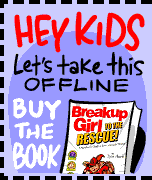

     |
| September 4, 2000 |
|
|||
|
I bought the cutest glasses at Restoration Hardware the other day! Italian, white line around the middle, with the word PESSIMISTA above and the word OTTIMISTA below. Get it? Half-empty, half-full. Oh! Oh! Tchotchkes like that give me hope for civilization (half-full!). Italian civilization, anyway (half-empty). Actually, at first I couldn't find the glasses, so I asked someone for help...and that someone, I realized mid-request, was Ricki Lake. I played dumb. So poor Ricki had to confront not being recognized (half-empty for her) ... but then again, she wasn't really working there (half-full!). So now I raise my glass, half-full of a lovely Chateauneuf du Pape, to the latest psychology news: Fine Whine: There's a new gadget in town, and it's called The Affirmatron. There's also a new movement in town, and it's called Positive Psychology. A growing number of pros are moving away from wondering "Why are folks bummed and how can we fix them?" and toward "Who are those happy people and how do they stay that way (even in the face of bummers)?" -- and, of course, "How can we use that 411 to help everyone?" After all, scientists suggest that optimists are better able to bounce back from setbacks, that a glass-half-full attitude is preventative medicine -- that optimists may actually live longer. Martin E.P. Seligman, Ph.D., former president of the American Psychological Association (APA), has even said: "Our concept of depression is all wrong...maybe [in some cases] what looks like a symptom of depression -- negative thinking -- is itself the disease." Psychology Today (May/June 2000) also reports: "Seligman projects that the movement's research will yield methods of making exercise less tedious, work more rewarding, relationships more enjoyable [oomph added] -- in short, making what is good in life better...A good marriage therapist might teach partners how to fight constructively, says Seligman, how to change a bad marriage into a workable one. But, the question is, how do you make a workable marriage sublime?" To those ends, Seligman & Co. -- while acknowledging that optimism is not universally appropriate or helpful -- are creating an authoritative body of psychological literature on "learned optimism" so that folks can truly be taught "how to maximize joy and good." Oh boy! Now you're all, "...and why don't I feel happy about that?" Worried that someone's gonna bust past BG security and come after you with "love is..." cartoons, funny eyeglasses, and turn-that-frown-upside-down exhortations that do the same to your stomach? Well, look on the dark side: there's also been a louder and louder call for...whimpering. A few weeks ago, a symposium was held at the APA's annual meeting called, "The (Overlooked) Virtues of Negativity." The New York Times recently reported: "While positive thinking has its advantages, [these psychologists argue], a little whining now and then is not such a bad thing. Pessimism, in some circumstances, may have its place. And unrelieved pressure to be upbeat, they assert, may gloss over individual needs and differences, and may make some people feel worse instead of better." Negative thinking can even be a coping strategy -- they call it "defensive pessimism" -- if and when you act on it instead of succumbing to it. A defensive pessimist (DP) would approach, say, a date, with a great deal of anxiety. Rather than reassuring him/herself with positive affirmations such as, "Doggone it, people LIKElike you!" the DP is more likely to picture him/herself running out of things to say, tripping over...nothing, squirting ketchup in his/her date's eye, etc. But the glass-half-full element of that approach is this: the DP may then also make plans to avoid such pitfalls, such as brushing up on current events, wearing sturdy shoes, and suggesting sushi. Says Dr. Julie Norem: "This mental rehearsal tends to make defensive pessimists feel less anxious, and so they actually perform better." Psychologists have also found that when their subjects focus on -- rather than flowery-wallpaper over -- big huge life bummers (say, by writing essays, or letters to superheros, about them) their health and spirits actually improve. Now, if you're already an optimist (or the Optimist) don't worry -- you can stay that way! The bottom line (or at least the one between OTTIMISTA and PESSIMISTA) is that your personal coping style -- whichever it is -- is at your service. Both "positive thinking" and "constructive negativity" can work fine, as long as you let them. But if your glass does look as empty as your calendar, I'm not (Affirmatron notwithstanding) gonna just say, "Buck up and it'll fill up!" Oh, no. Go ahead and envision the worst -- like, as Bridget Jones so daintily puts it, that you will "end up dying alone and found three weeks later, half-eaten by an Alsatian." Then, in true DP form, take steps to make that not happen. Or at least go ahead and write to me about why it will. I'll at least try to keep you away from all the optimists getting up, brushing themselves off, and saying, "Well, at least I was only half-eaten!"
|
||||
|
||||

 |
